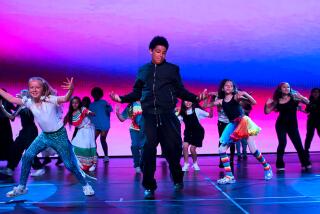In his 12 years as director of...
- Share via
In his 12 years as director of the Dance Kaleidoscope series, Don Hewitt won every good-guy award the local community could bestow. And on Saturday, at the end of a special evening honoring the end of his directorship, he stood on the stage of the Japan America Theatre surrounded by dancers delivering their goodbye gifts, hugs and kisses.
Earlier, he had told the audience of how much producing Kaleidoscope had taught him about different cultures--a statement reinforced by more than 150 videotape clips of Kaleidoscope dances shot over the Hewitt years by Adrian Ravarour and edited by Kate Johnson as a prologue to the program’s live performances.
However, by summing up Hewitt’s achievements as “75 Performances, 8 Venues, 200 Dances,” the tape may have done him a disservice, for other presenters could match these numbers without earning the gratitude that a beleaguered and always oddly passive local dance community felt toward the opportunities that Kaleidoscope provided.
With Hewitt departing for Portland, and no Kaleido-successor yet announced, the community’s ability to do more than bestow awards may be sorely tested in the near future. But the commemorative program Saturday wasn’t about the future, but rather a conceptualization of Hewitt’s Dance K. as some sort of golden age.
In contrast with ambitious Hewitt seasons in the past, this represented the only Dance Kaleidoscope event of the summer, and contrary to Hewitt’s artistic policies, the participants were selected by invitation, not an audition process. As a result, it proved a Super K., distinguished by a sustained excellence that Kaleidoscope never achieved in its programming, whether under Betty Empey in the late ‘70s and early ‘80s or Hewitt himself.
The seven-member Tongue ensemble supplied a heady dose of contemporary bravado in Stephanie Gilliland’s breakneck deconstruction of hip-hop, “Big Manuel.” But Loretta Livingston’s powerfully danced character study “The Stray” capitalized on a different kind of daring in its violent juxtapositions depicting a woman unhinged by fear.
Livingston collaborated with Gema Sandoval of Danza Floricanto/USA on “The Promise,” contrasting a folkloric duet with a contemporary partnership to show the gulf and link between first-and second-generation Mexican Americans.
In Ramaa Bharadvaj’s South Indian-style “Suddha Nrittam,” she and her daughter Swetha danced in expert mirror synchrony, though the remarkable detail and interplay of their performances became fully evident only when they moved onto the forestage.
Fielding 16 dancers, Kayamanan Ng Lahi Philippine Folk Arts cleanly executed a splashy suite from Southern Mindanao. But the sure-fire “Singkil,” in which dancers stepped through a network of moving bamboo poles, may have grown overly familiar. A moratorium is recommended, especially when an intriguing trance dance was given such a brief showing.
Even briefer: Channing Cook Holmes’ spectacular solo moments in the Jazz Tap Ensemble’s genial if mostly uneventful “Tap Tribute to Don Hewitt,” featuring Holmes, artistic director Lynn Dally and four others. Holmes’ action-portrait of Gene Kelly and additional inspirations always seemed on the verge of becoming the evening’s most memorable achievements--but he kept pulling back so it didn’t happen. Three artists presented pieces from the 1970s. Matthew Rushing, a former Hewitt student at the L.A. County High School for the Arts and now a leading dancer with the Alvin Ailey company, delivered a gorgeously sculpted performance of a showpiece solo from Ailey’s “Love Songs,” though one missing the depth of feeling that Dudley Williams has brought to the same choreography. Similarly, the Lula Washington Dance Theatre concentrated on externals in its forceful interpretation of Donald McKayle’s gutsy “Songs of the Disinherited” suite.
However, Victoria Koenig managed to get inside the mixture of ballet moves, expressive gesture and traditional Polynesian physicalization of song-texts in a reflective solo by Earnest Morgan titled “Ku’u Home O Kahalu’u.”
At intermission, Shel Wagner Rasch sloshed in a fountain and Stephanie Nugent slithered over a wall and ledge, but their new site-specific improvisation looked awfully studied compared to the freestyle, impromptu dancing by various audience members.
More to Read
The biggest entertainment stories
Get our big stories about Hollywood, film, television, music, arts, culture and more right in your inbox as soon as they publish.
You may occasionally receive promotional content from the Los Angeles Times.










